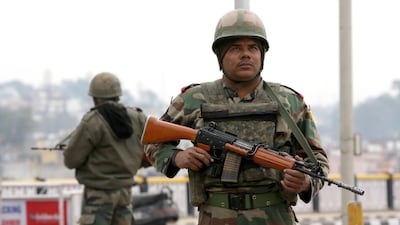The mountain region of Kashmir has been at the heart of animosity between Pakistan and India since Partition in 1947 and continues to dominate their relations.
Dispute over the stunning Himalayan region has been the trigger for two of the three wars between the neighbours and in the 1990s caused a showdown, raising fears of nuclear conflict.
When British rule ended on the sub continent, the princely state of Kashmir had the choice of whether to accede to India or Pakistan. Its ruler, Maharaja Hari Singh, was Hindu while most of his subjects were Muslim. Hoping to remain independent, he chose to remain neutral, but found his hand forced by events. When Pakistan-backed Pashtun tribesmen invaded and his Muslim subjects rose up along the Western borders of his state, the Maharaja appealed for Delhi's assistance and acceded to India. Thus began the first war over the territory between the neighbours, ending in 1949 with a UN-brokered ceasefire and the division of the territory by a heavily militarised line of control, which still stands. Both sides have since laid claim to the entire territory, but ruled it in part.
Fighting flared again in the 1965 and 1971, until the Simla Agreement in 1972 saw the enemies vow to settle their differences peacefully.
With Kashmir home to movements wanting both union with Pakistan and independence from both nations, Delhi has maintained a strong military presence. Heavy handed attempts to deal with dissent and impose rulers have deeply angered the Kashmiris.
Violence broke out again in 1989 when pro-independence and pro-Pakistan guerrillas struck in the Indian Kashmir valley and insurgency has ebbed and flowed ever since. India blames Pakistan for backing militants and destabilising the region. Artillery exchanges across the line of control are a regular occurrence. A bitter high altitude clash erupted in Kargil in 1999 when militants Delhi accused of being backed by Pakistan infiltrated into Indian controlled territory. With the enemies by then both nuclear armed, Bill Clinton stepped in to try to stop the fighting from escalating.
Last decade saw a thaw in relations with a partial opening of trade and transport links. But in Indian controlled Kashmir another cycle of violence began in 2016 when security forces killed Burhan Wani, a local militant leader with a mass following. India's heavy-handed response to the protests which followed has been criticised by the United Nations and has inflamed anger in Pakistan. The crackdown has also enraged and alienated large numbers of young Kashmiris. Last year was one of the bloodiest in the region in years.
A suicide bombing killing at least 40 paramilitary police is the latest flashpoint. The attack was claimed by the Pakistan-based Jaish-e-Mohammad militant group – Delhi says it has proof it was backed by Islamabad. Pakistan denies any involvement. The incident has triggered a familiar round of rhetoric, escalation and nationalist fervour on both sides of the border and the wound which prevents rapprochement between the neighbours shows no sign of healing.

